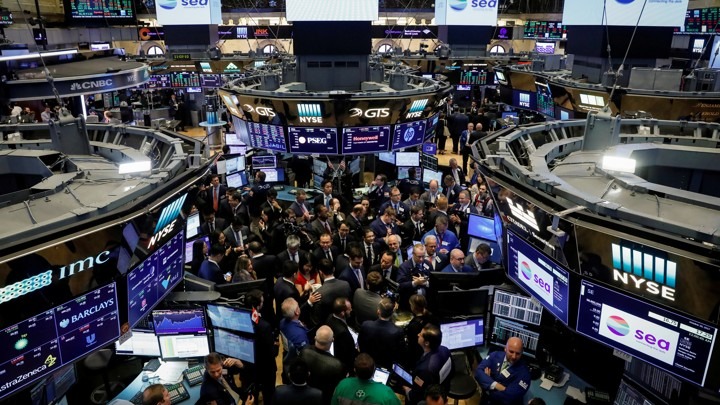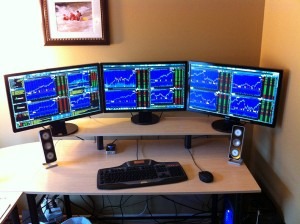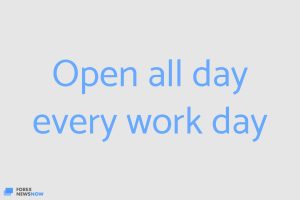Forex Vs. Stocks: Which one is better to trade?
Contents
- 1 A quick overview of Stock and Forex markets
- 2 Comparing Forex vs Stocks liquidity
- 3 Forex vs Stocks which is more profitable?
- 4 Trading Stocks vs trading Forex technical analysis
- 5 Forex vs Stocks trading times
- 6 Is trading Forex harder than stocks?
- 7 Trading Forex vs stocks are there any advantages in diversity?
- 8 Which is better? Forex or Stocks?
Finding a nice paying job in 2018 is not as easy as some would think. By the calculations of the UN, some professions will even be gone by 2050, because of how fast we are digitalizing. But there are concerns about how that will impact the economy and general well-being of the ever-growing world population. Having a limited amount of jobs right now is bad as it is, so can you imagine when it becomes harder? Look back on 2008 in the USA. When the stock market crashed, a lot of people lost their jobs and were unable to find a new one, it was just impossible during these economic times. So what many opted for was the sweet release of the banks, which were one of the main contributors of the crash for giving out loans way too easily. But the reason people kept going to them was the fact that, keeping your money on a specific bank account generated some income within a year.
However what many people didn’t know was that the interest rate on those deposits was so bad, they couldn’t even keep up with inflation. Therefore some of those people started to look for something more realistic and profitable. Therefore they found Forex and stocks, but it may be confusing to decide Forex vs Stocks, which one is better? This is exactly the question you have right? I know I’m right because I have a masters in telepathy, I’m reading your mind right now. I think you need a drink, grab one and let’s get started with deciding between stocks and Forex.
A quick overview of Stock and Forex markets
Before we start comparing Forex vs Stocks, let’s have a quick rundown of what they actually are, how they function and why you should know. I know, I know it may sound boring but it will be over before you can say “chicken salad” (I like chicken salad).
Both of these markets are connected to the financial industry. Both of them deal with trading and offering money making opportunities. The similarities end there, however, as the nature of both markets makes them quite different from each other. For example, the trading process of both of them might seem very alike, but once you get to know the assets you’ll quickly see the differences. These differences are the ones that create all of the advantages and disadvantages of the markets when we start to compare them let me bring it more into the light.
The Stock Market
The stock market is quite easy to comprehend. it can be easily explained in just one sentence “you buy a part of the company”. Easy as that, but that’s not explaining too much does it? What happens is that once you buy some company shares, you own a part of it. So as the company grows they are able to adjust their stock prices to their relevancy and demand. For example, if you bought $100 worth of Apple stocks when it was the first beginning, you would be a millionaire right now. You see a company can list its shares, which could amount in the millions. For example, a large company’s 1 single share could be equivalent to 0.000000001% of its total market value. Most of the times companies don’t make their shares fixed, they let them float on the market and adjust accordingly to supply and demand just as Forex does.

The Stock market is centralized. This means that companies that are in the USA are only listed on US stock exchanges, which creates some barrier for foreigners willing to take part. So pretty much your place of residence can affect your profitability in stock trading. The Forex market is a lot more easy to access, but we need to take a good look at it before we can compare the Stock market vs Forex market. So now that we’ve quickly covered stocks and how they work, let’s move on to Forex.
The Forex Market

The Forex market is not too hard to comprehend as well. It is a market where international currencies are exchanged in pairs. As simple as that, but just like with stocks, I can’t explain it in just one sentence, you haven’t said “chicken salad” yet, right? Anyway, back to the point. Forex trading is slightly different, yes the occurrence of buying and selling happens in both markets but, with Forex it is a bit different. You see when you are making a “sale” in Forex it also means that you are buying something. Ok, let me put that into perspective. You can trade currency pairs with Forex, that much is clear already, but what it means is that you can trade USD and EUR for example. Which means that when you are trying to sell the USD, you are getting paid with EUR from someone who bought them for you. The same thing happens when you buy USD, you pay with EUR, this is how the currency pair trading works.
What Forex truly has an edge in the Stock market vs Forex market argument is the decentralized environment. Which means that there is no “special” place to trade Forex and it is not exclusive to a specific country. Thanks to the wide variety and need to exchange currencies the Forex market was able to become decentralized, which means that you can trade USD with EUR even if you don’t live in the United States or Europe.
Comparing Forex vs Stocks liquidity
Liquidity is a broad term, however, it has become embedded in the minds of traders after so many years of use. If you don’t know what it is let me help you out here. Good liquidity is an attribute something gets when it is easy to sell, bad liquidity is when its hard to sell it. So, for example, some type of food would have more liquidity than a laptop. Not everybody needs a laptop but everybody needs food so you’d have a larger market size to sell to if you opt for the food. Now let’s ask the question which is better, Forex or stocks? At this moment we’ll talk about the liquidity of course.
Forex Liquidity
As I have already mentioned, the more people are willing to buy your item, the more liquidity it has. Forex is the largest market in the world with over $7 trillion in daily trades. Which gives you a good perspective of how many people will be willing to buy your currency. Therefore this liquidity creates a great opportunity for traders to have a short-term strategy. For example, you buy Euros and after 10 minutes see that the price has increased to a point where you can make a profit, you can sell immediately, without any setbacks, because you’re sure there is someone on the other end willing to buy. Thanks to this good liquidity with Forex, the market has become quite volatile. Volatility is when prices change rapidly within a day. Volatility is exactly why some traders choose Forex as it can be a faster and easier way to make profits, although not the safest.
Stocks liquidity

Before I start with stocks, I want to tell you that liquidity can seriously affect the Stocks vs Forex profit argument. I’ll explain this in the next paragraph for you to understand it better, but for now, let’s look at stocks liquidity.
So liquidity for stocks is not as good as Forex. Why? because imagine, which would be handier to have? some currency that you can use immediately for whatever you want? or a piece of paper that you can only sell. The currency right? But it’s not that simple. You see with stocks it’s very hard to make a profit with a declining market as you’ll find it hard to see any short-term increases for small profits. So what happens is that once the stock price goes down it doesn’t play around with volatility, meaning that there aren’t too many short bursts of an increase. usually, the graph just goes straight down and then it shoots up. Because of this during the declining markets many people sell immediately and most of the times they find it hard to find potential buyers, leaving them with stocks that are about to become half their price and they can do nothing about it.
So Forex the winner in terms of liquidity for the question “which is better, Forex or Stocks?”. But, if you disagree with me, feel free to comment and let me know your arguments, I’m always open to criticism, just don’t be harsh I’m quite sensitive.
Forex vs Stocks which is more profitable?
Here we have probably the most demanded paragraph of the whole article, you may have skipped the whole article for this one, which, although hurts my feeling, is still Ok. Now have the age-old question of profitability answered shall we? Once again I’ll list and talk about the two separately so as to not seem subjective. Let’s go!
Forex profitability
Forex is indeed profitable, there is no denying it. However, those profits can be quite limited if you don’t have a beefy account. By a beefy account, I mean like $100,000. Sure it’s easy to make $1,000 from that account with relatively small risks, but it can also be increased the more leverage you use. What’s leverage you asked? Thank god I thought you wouldn’t. Leverage is a service that your broker provides you. For example, if the leverage is 1:30 and you want to initiate a $100 trade, you’ll have the option to turn it into a $3,000 trade. This means that the Forex broker increases your trade money by the amount of the leverage, but then expects it all back, so be careful if you use it. Forex has an upper hand in this as the leverage with it can be a lot higher than with stocks. For example one of the highest leverages to be found is 1:1000, while the highest stock broker’s leverage you can use is 1:5. So when it comes to trading with more funds, Forex is the place for you, but remember that large profits require even larger deposits.
Stocks profitability
Stocks are completely different. Most people that trade stocks are looking at it as a long-term investment, they rarely use it for its volatility. Let me bring you a perspective. For example, you make a purchase of $500 worth of Apple stocks, sure it will increase over the few weeks by like 0.0005%, which could be nice with larger deposits, but the same story as with Forex, smaller deposits aren’t too good. However, what stock trading can be amazing for are the investments you make in smaller companies. Ok, let me give you a better perspective. Just like I said in the Stock market explanation if you had bought Apple stocks worth $100 back when it was the first beginning, you’d be a millionaire right now. This means that there are chances where you can make crazy amounts of money if you choose your company right.
So in terms of profitability, which is better? Stocks or Forex? Well, in this case, I’d say they’re pretty much even, it’s definitely up to you to decide. Do you want a more engaging way of making profits? then go for Forex. If you want a long-term chill experience of trading than go for Stocks. The profitability is relatively similar so you won’t be seeing too much of a difference no matter which one you choose.
Trading Stocks vs trading Forex technical analysis
In terms of learning how to trade on both platforms, we have different variations. For example, I will need to cover the managing systems, the times you can trade in and the accessibility. So expect this paragraph to be a bit bulky, but for the processes and comfort, it will be quite good information.
Forex vs Stocks trading times
As I have already mentioned there is one big difference between the Forex market and the Stock market. The former is decentralized and the latter is not. Which means that there will be some difficulties in terms of flexibility for stocks. Here’s why.
Trading stocks could be some sort of an exclusive experience for people all around the world. For example, trading US company stocks is best suitable for US citizens as they’re in the same time zone as the markets. You see all of the orders for US stocks are processed in brokerages that are tied to the US stock exchange, which operates in the US time zone. So for example, if you are on the other side of the globe, by the time you’re awake, the US stock market may have already closed down. This can ultimately mess up your whole schedule as you may have a job or university to go to and can’t afford to stay up late at night. So, in this case, is it better to trade Forex than stocks? Well, it depends, where you live. If your local stock market is pretty good then sure why not, but if it’s not then you may have some problems.
 Trading Forex has a completely different schedule. As a matter of fact, it doesn’t have a schedule at all. What do I mean by this? Imagine, you are trading currency pairs, which means that there are 2 sides involved, therefore there should be some kind of coherence between the two. So you have two separate parties responsible for the same service, meaning that it doesn’t have to go through a central middleman. Plus there is the fact that currencies need to be exchanged pretty much all the time, right now when we were talking there were probably more than a million exchanges made. So it keeps the market alive 24/5 allowing you to actually make your own schedule. In terms of timing is Forex trading better than stock trading? Yes it is a lot more flexible, plus you’ll have no restrictions in what you can trade, pretty much every broker offers currency pairs of the major economies like the USA, Japan, and the UK.
Trading Forex has a completely different schedule. As a matter of fact, it doesn’t have a schedule at all. What do I mean by this? Imagine, you are trading currency pairs, which means that there are 2 sides involved, therefore there should be some kind of coherence between the two. So you have two separate parties responsible for the same service, meaning that it doesn’t have to go through a central middleman. Plus there is the fact that currencies need to be exchanged pretty much all the time, right now when we were talking there were probably more than a million exchanges made. So it keeps the market alive 24/5 allowing you to actually make your own schedule. In terms of timing is Forex trading better than stock trading? Yes it is a lot more flexible, plus you’ll have no restrictions in what you can trade, pretty much every broker offers currency pairs of the major economies like the USA, Japan, and the UK.
Forex vs Stocks which is better for beginners?
In this part, I’ll mostly talk about how easy it is to actually access the markets and start trading. You will feel that it’s a bit subjective, how do I know? because of my telepathy masters remember? But it’s not, it’s just the fact that there is a massive difference between the two in terms of minimum deposits.
Forex minimum deposits
Forex is way more accessible, let’s just start off with that from the get-go. The minimum deposits that you will see with brokers is a lot smaller. The smallest I’ve seen was $50 for you to start. Once that deposit is made, you’re free to start trading with it. Even using the leverage that the broker offers. In terms of the average deposit volume, it sits somewhere between $200 and $250, so Forex is a lot more risk-free for beginners as it’s not that big of a commitment.
Also, the advantage of trading Forex over stocks is the bonus system of the industry. Generally, there are 2 types of bonuses. A deposit bonus and a no-deposit bonus. Let me bring an example with sandwiches. Alright let’s say that there is an event with Subway that when you buy 1 sandwich, you get another for free, that would be the deposit bonus. However, there is another sandwich place that offers a free sandwich if you just walk in the store, that is the no-deposit bonus, I think that’s the easiest way to explain it.
With brokers, it happens like this. With the deposit bonus, you sign up, you deposit a given sum and the broker will give you somewhere between 10% or 100% of your deposit as a bonus, which means that if you’re a beginner and opt for a minimum deposit of $200, the broker can have a feature that gives you another $200, meaning a 100% deposit bonus. You’re starting to see why trading Forex is better for beginners than stocks right? But we’re not done yet.
With a no-deposit bonus, it’s a bit different. You sign up, follow some guidelines that brokers have like a specific code that you need to use or a customized email you need to send. After you follow the guidelines you’ll be eligible for the no-deposit bonus. Meaning that all you had to do was sign up and the broker gives you money to trade. Usually, it’s between $100 and $1,000. Remember though, withdrawing the bonus is not possible from the beginning, you’ll have to trade a specific amount to be eligible for a withdrawal.
Stocks minimum deposit
Stocks usually have a much higher barrier for the minimum deposit. The smallest I’ve seen was $500, already creating some sort of risk for a beginner. But on average it amounts to about $2,000 with most brokers. The bad thing is that you won’t have bonuses available with most of the stockbrokers, honestly, it’s quite rare with them. In terms of leverage, you’re also at a disadvantage because of how low it can be, maximum 1:5. So, in this case, there is a bit more commitment involved as you’ll mostly be trading with your own money and not the money a broker gave you. But honestly, this could also be a good thing as it may help to avoid debts with the broker if you have an unlucky day.
Is trading Forex harder than stocks?
This ultimately boils down to the management you are capable of. But let’s just assume that you are a beginner. In this case, you may find that stocks require a lot less attention and micromanagement, because of the reasons I’m about to list. But as always let’s separate them.
Managing Forex trading

Forex trading can be a bit overwhelming, because of the number of currency pairs you can have and track. Many beginner traders burn themselves out by how mentally taxing it could be sometimes. My advice to you would be to choose no more than 2 or 3 currency pairs and stick to them until you’re confident you can add another. But why is trading Forex harder than stocks? It’s because of the information you’ll need to have.
What type of information? Things like the news, political development, international trade, local economies and so on. Now, this may become quite overwhelming as there are way more factors that affect a currency, than a stock. Ok, let’s say that the US starts a war, that’s a reason why the currency may go down. The US also has elections, the currency also goes down, depending on who wins the currency will react. The outcome of the US-China trade war, also affects the currency, more political division may also create some problems, so on and so forth. You can see that there are way too many factors that could have an effect, meaning that you’ll have to be multitasking all the time. This is why I suggested a small number of currency pairs, to begin with as you’re more likely to have a manageable experience.
Managing Stock trading
Managing stocks can be a lot easier than Forex. Because there is just one company, and it isn’t much it can do to be in the news every day. Therefore you’d have a more relaxed schedule of paying attention. Sure there can be some policy changes that affect its stock price, but usually, they’re the ones to release have a press conference or an exclusive press release, so there’s no delay.
What’s also good about stocks is the customization. For example, if you want to trade Forex you’ll need to be at least a little bit knowledgeable about the economy and finance in order to make good decisions. With stocks, you can just go for a company that is right up your alley. For example, I really like video games, so it’s a good decision for me to buy some Game developer company stocks like Blizzard or Bethesda. It will help me be more in tune with the news and make better decisions when trading.
Stocks are also quite fragile to small mistakes a company would make, but in time you’ll quickly see a pattern. For example, a PR mistake will decrease the stock price, maybe some kind of a hack that could occur on its social media page or even just a small typo in the information. But those are quite obvious reasons why the price may decrease so they’re easier to analyze.
So after all of this talk, if you want an easy experience should you trade Forex or stocks? Stocks are the winners here as they offer a more customizable management system and are more easy to predict and track.
Trading Forex vs stocks are there any advantages in diversity?
Diversity is a broad term, let’s boil it down to something more comprehensive. What is diversity in these markets? Well, it’s the number of toys you get to play with and of course the people who allow you to play. And of course, the categories. I’ll be focusing on some brokers here as well as the assets that you can trade with each industry. let’s bring them into perspective.
Forex diversity
With Forex brokers usually what you see isn’t necessarily what you get. I mean that in a good way though. For example when you hear that a specific company is a Forex broker you only expect them to feature Forex trades, but you would be wrong.

Many of these brokerages have found profit in diversity, therefore most of which you will visit can offer quite a lot of assets. For example, this is the typical list of assets that an FX brokerage may offer: Forex, Cryptocurrencies, CFDs, ETFs, Commodities. There’s also many more so you know you’ll be able to diversify your portfolio quite well.
But let’s now focus on just the Forex assets, are there any advantages? Well technically yes, but not all of the brokers offer it. For example, it is possible to trade with every imaginable currency pair but there are very few brokerages that offer pairs other than the major ones like the USD/EUR and USD/GBP.
Stocks diversity
Stocks are winners in this part as well in my opinion. But there are some setbacks. For example, the stockbrokers aren’t as engaging and effective as Forex brokers, most of the times they only offer the platform and maybe some small bonuses like signals that send you info about major events. But other than that, there are little to no perks available with them. In terms of asset diversity, you’re also quite limited with a stockbroker as most of them only offer stocks, funds, and indexes, it’s quite rare to find something else like Options, ETFs and cryptos with them.
However, stocks as assets themselves are quite a good choice in terms of diversity. Most of the stockbrokers offer stocks of every company listed on a specific country’s exchange. For example, with a US broker, you’ll be able to find the big players as well as the small companies listed everywhere. This means that there’s way more accessibility and diversity to those assets. Having smaller company stocks usually don’t cost much for the broker, sometimes it doesn’t even cost anything, while an unorthodox currency pair could be quite hard to handle for a Forex broker.
In this case, we are also met with advantages as well as disadvantages. But remember we are only judging the assets themselves, Forex and stocks, so in this case, I believe that trading stocks is better than Forex. But this is solely about diversity and not counting pretty much everything else.
Which is better? Forex or Stocks?
After so much reading for you and writing for me, we need to wrap it up somehow don’t we? We’ve covered pretty much everything. The only thing that could have been addressed is the fees that you may face with different brokerages, but that doesn’t fit in the theme of the article. Here we are solely focusing on the advantages and shortcomings for both of the assets.
I’d say that these two bad boys are even, don’t you think? Sure there are some parts when one is better than the other, but overall summing up their features, it’s easy to say that both could be a really nice choice. Here are 2 sentences that could help you out more to decide. Do you want to trade fast and have to wait less? Trade Forex. Do you want to invest and hold onto your assets having an easy going trading experience? Trade stocks.
However, I would suggest that you make your own decision. So what are you waiting for? go try them out, they both have demo accounts that you can use to practice. An hour of practice will give you more knowledge than a week of research. No matter what you do, I wish you good luck.


























Comments (0 comment(s))